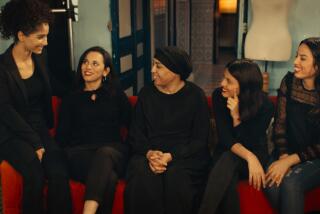Muslim Women Again Donning Veils in Egypt : Islam: Piety, modesty and fear spur more conservative dress. The move underlines a wider return to religion.
- Share via
CAIRO — A newly felt fear of God’s wrath led Shireen Soleiman, a 30-year-old housewife from a well-to-do Cairo family, to cover her flowing, black curls under a Muslim veil.
It had not been part of her attire, nor her upbringing, among Egypt’s privileged. But after her mother-in-law died three years ago, she sought comfort in the cassette recordings of Omar Abdel-Kafi, who preaches that disobedient Muslims will be tortured in the grave.
The veil, he says, helps make a woman a good Muslim.
“There is no guarantee in this life,” said Soleiman, who speaks in measured tones but with the assurance of a convert. “Many people die while they are still young.”
Women of all ages are covering themselves as never before in Egypt’s modern history, underlining a wider return to religion as Egyptian Muslims contemplate their identity after decades of frustrating political and social stagnation.
Piety, modesty or the desire to avoid harassment are among the reasons women cite for wearing the veil. And the social pressure is growing as more and more women cover themselves--and fiery Muslim preachers such as Abdel-Kafi deliver their dire warnings.
The veil itself is conveniently versatile.
Some department stores now cater exclusively to veiled women, offering a wide assortment of clothing--from bright floral kerchiefs popularly called hijab that leave the face exposed, to full-length, all-black niqabs that cloak everything but the eyes.
This is a far cry from the Egypt of the 1950s and 1960s, when bare arms and miniskirts were the fashion standard for urban women. The hijab was rare; the niqab was virtually unheard of.
Now it is more common to see women with the veil than without--and not just in Egypt. Women in Arab countries from Sudan to the Persian Gulf are donning the veil in what has become the most overt sign of growing conservatism across the region.
Oppression is how Western and Egyptian detractors describe the phenomenon. It is just another instance in which women are relegated to second-class status in the Muslim world, they say.
Said al-Ashmawi, a former judge and writer whose liberal interpretation of Islamic law has angered conservative Muslims, contends the veil has become “a political slogan, not religious obligation.”
Its defenders--and there are many--say the veil allows them to avoid harassment in the crowded streets or at work. They discount any pressure to wear it.
On religious grounds, they cite a Koranic verse in which the Prophet Mohammed’s wives are instructed to conceal their bodies from strangers. Some Muslims interpret that to mean the face as well.
This year, movie director Yousri Nasrallah made the first film on the topic, a documentary called “On Boys, Girls and the Veil.”
Nasrallah, a member of Egypt’s Coptic Christian minority, argues that the veil’s surge in popularity among Muslims is due to social and economic pressures buffeting the country and not sudden devoutness among Egyptian women.
“Egypt is going through economic, social, cultural and identity crises,” he said, echoing others who say Egypt’s economic and cultural opening to the West in the early 1970s was instrumental in the veil’s return.
In recent decades, Nasrallah noted, increasing numbers of women entered the workplace to help their families make a living.
Meanwhile, many of their husbands took jobs abroad in the oil industries of wealthier Arab countries such as Saudi Arabia, where they were influenced by far stricter Islamic mores. The men began worrying about the virtue of their womenfolk back home.
“We are living in a society that blames women for the seduction of men and considers men to be not responsible for controlling themselves,” Nasrallah said. “There is a crisis in masculinity--and not femininity--in Egyptian society.”
In his documentary, he talks to young Egyptians about relations between the sexes.
“People think badly about those who are not wearing the veil,” said Marwa, a female teacher.
Others said they took the veil to stop men’s advances or as a sign of modesty. Some suggested the veil would help them get married, believing that Muslim men find pious, modest women more appealing and better suited to rear their children.
Abdel-Kafi, the preacher, was banned in 1993 for claiming that Muslims should not greet Christians, let alone wish them a happy Easter.
A dapper man with a neatly trimmed beard, Abdel-Kafi became popular a few years ago among bored housewives of the upper-middle class, whom he seeks to target with his sermons. Despite the ban, his sermons retain a wide underground following.
More to Read
Sign up for Essential California
The most important California stories and recommendations in your inbox every morning.
You may occasionally receive promotional content from the Los Angeles Times.












